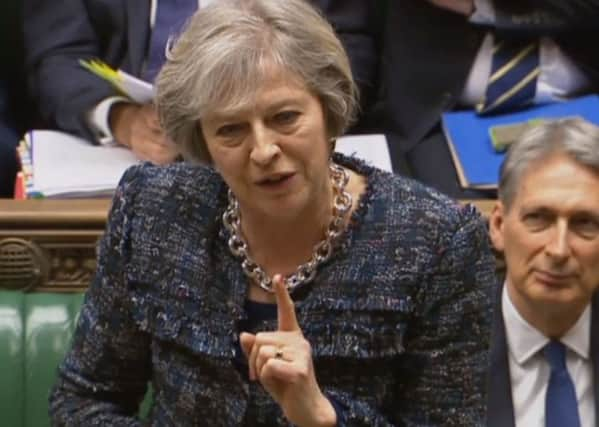YP Comment: May must broaden Brexit debate


Yet, while the Labour leader’s appearances at the despatch box do little to enhance his credibility, he was within his rights to question Mrs May’s decision not to first reveal her 12-point negotiating strategy to the House of Commons.
Even though it is a virtue of Britain’s Parliamentary system that Ministers have to answer questions on a regular basis – just imagine President-elect Donald J Trump facing a weekly inquisition – the Brexit process is about Westminster repatriating powers from Brussels and reasserting UK sovereignty when it comes to law-making. And while Mrs May’s decision to submit her final deal to a Parliamentary vote could be construed as a political trap for her opponents prior to the 2020 election, she still has many obstacles to overcome before she reaches this point.
Advertisement
Hide AdAdvertisement
Hide AdIt’s why she must be open to receiving innovative ideas from all sections of society – Brexit will impact upon every household and every business in the country. This alone is reason for Parliament devoting at least one day to debating each of the 12 themes set out by the PM – every last detail will matter if Britain is to prosper. A regional dimension to this process is also imperative. Though the Scottish Government is being very vocal, and the devolved Welsh administration finalising its submission, Yorkshire and the North’s interests must be represented. As the Archbishop of York said a week ago with regard to Brexit: “We need a more diverse economy that draws on the skills of Northern people.” It won’t happen, however, if Mrs May bypasses Parliament because she regards elected MPs as a hindrance – great leaders relish and embrace such scrutiny.
Yorkshire must not ask for pity
IT goes without saying that Yorkshire has received a raw deal from successive governments – this newspaper has, for a decade, been highlighting the disparity in transport and infrastructure spending between London and the North.
Yet Yorkshire has to do more to help itself. When submissions are made to Whitehall, they need to be so compelling that Ministers have to accede to them – asking for pity will simply not suffice.
The need for a change in tone, both in style and substance, follows the confluence of three interventions as business leaders call for the county’s devolution differences to be reconciled once and for all.
Advertisement
Hide AdAdvertisement
Hide AdFirst Leeds Council leader Judith Blake. A proud advocate of her city, her 4,723-word oration to Winchester University lost impact because she spent too much time blaming others rather than offering a clearer vision for the future governance of her city-region – and the region at large.
Next the Resolution Foundation’s report highlighting below-average salaries in Sheffield and South Yorkshire. Days after the area’s devolution deal collapsed, it challenges local leaders to get the issue ‘back on track’ and suggests a Low Pay Commission be launched. It forgets the public want more effective governance, not additional tiers of bureaucracy.
Finally South Yorkshire crime commissioner Dr Alan Billings and his call for extra funds. Though his force is dealing with many challenges of a historic nature, the Government does not have a bottomless pit of money, another reason why the onus is on local politicians to start thinking outside of the box.
Where’s the respect on the buses?
FIVE YEARS after Doug Paulley was left stranded at a Wetherby bus stop because a mother refused to move her child’s pushchair from a space reserved for wheelchair users, his stance has been upheld by the High Court in a landmark victory.
Advertisement
Hide AdAdvertisement
Hide AdThe regret is that it even came to this. Mr Paulley’s battle began in 2012, the year that London hosted the Paralympics which changed the public’s attitudes towards the disabled so wheelchair users were accepted as equals.
If passengers, whether on the bus or train, were more respectful of the disabled, the elderly or those with mobility difficulties, and transport operators like FirstGroup actually trained their staff to be more aware of this issue, it would not have required the intervention of the courts. After all, good manners cost nothing – a priceless notion which is in danger of being undermined by a selfish and thoughtless minority’s lack of respect. How sad.